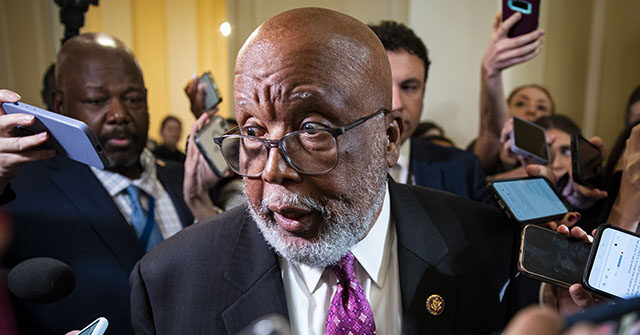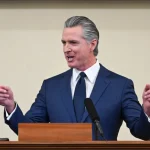
Rep. Bennie Thompson (D-MS) introduced legislation on Friday that targets former President Donald Trump and would take away his Secret Service protection if he is convicted in his trial.
The post Democrat Bennie Thompson Proposes Bill to Strip Trump of Secret Service Protection if Convicted, Sentenced to Jail appeared first on Breitbart.

Rep. Bennie Thompson (D-MS) introduced legislation on Friday that targets former President Donald Trump and would take away his Secret Service protection if he is convicted in his trial.
In a post on X, the House Homeland Security Committee Democrats revealed that Thompson, the top member of the committee and the former chairman of the now-defunct January 6 Select Committee, had introduced legislation that would ensure “convicted felons sentenced to prison” would have no Secret Service protection.
In a statement, Thompson said:
Unfortunately, current law doesn’t anticipate how Secret Service protection would impact the felony prison sentence of a protectee-even a former President. It is regrettable that it has come to this, but this previously unthought-of scenario could become our reality. Therefore, it is necessary for us to be prepared and update the law so the American people can be assured that protective status does not translate into special treatment-and that those who are sentenced to prison will indeed serve the time required of them.
JUST IN: Congressman @BennieGThompson introduced legislation to ensure no Secret Service protection for convicted felons sentenced to prison.
READ MORE HERE: https://t.co/pwSYtd5sVN pic.twitter.com/1N65BHk5yQ
— House Homeland Security Committee Democrats (@HomelandDems) April 19, 2024
The Denying Infinite Security and Government Resources Allocated toward Convicted and Extremely Dishonorable (DISGRACED) Former Protectees Act says that protection will “terminate for any person upon sentencing following conviction for a Federal or State offense that is punishable for a term of imprisonment of at least one year.”
Thompson argues in a fact sheet for the DISGRACED Former Protectees Act, that the bill “would remove the potential for conflicting lines of authority within prisons and allow judges to weigh the sentencing of individuals without having to factor in the logistical concerns of convicts with Secret Service protection.”
Although Trump’s name is not mentioned in the bill’s text, the fact sheet points out that “former President Donald J. Trump’s unprecedented 91 felony charges in Federal and State courts across the country have created a new exigency that Congress must address to ensure Secret Service protection does not interfere with the criminal judicial process and the administration of justice.”
The fact sheet also points out that the bill proposed by Thompson will “apply to former President Trump.”
Byron York, Chief Political Correspondent with the Washington Examiner, pointed out in a post on X that the underlying “obvious subtext” was that taking away Trump’s Secret Service would make it “easier for someone to kill Trump.”
York wrote:
Democratic Rep. Bennie Thompson ran the January 6 committee, which mixed elements of show trial and reality series. Focused solely on Trump, of course. Now, Thompson wants to take away Trump’s Secret Service protection if Trump is convicted on any of the 88 felony charges levelled against him by elected Democratic prosecutors and a Biden Justice Department appointee. Obvious subtext here is that removing USSS would make it easier for someone to kill Trump, which is arguably the goal of Thompson’s bill, H.R. 8081: The DISGRACED Former Protectees Act.
Trump’s hush money trial, which began on Monday, saw more than 50 potential jurors out of 96 dismissed on the first day after they indicated they were unable to be impartial. On Thursday, 48 more potential jurors were dismissed after indicating they could not be fair.
Bragg charged Trump in April 2023 with 34 counts of falsifying business records in the first degree in relation to hush money payments made to adult entertainment star Stormy Daniels during the 2016 presidential election.






